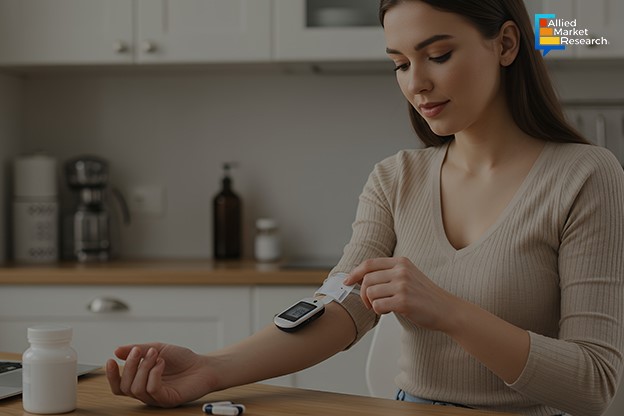At-Home Testing: A Convenient Approach to Medical Diagnosis and Treatment

27 Mar
2025
Highlights:
- Introduction
- Advantages of at-home testing services
- Product launches in the industry
At-home testing is a healthcare intervention involving the use of medical kits that require patients to collect samples at their homes, send them to the laboratory for analysis, and then get results delivered back through mail or other digital methods. In the COVID-19 pandemic, the social distancing norms and lockdowns enacted by governments in several countries increased the adoption of these kits. During this period, people generally avoided visiting hospitals for checkups due to fear of SARS-CoV-2 infection which led to a surge in the utility of at-home testing services. Over the last few years, their popularity has further increased due to the advent of new medical kits that aid in diagnosing chronic diseases such as cancer, diabetes, and HIV. Apart from this, at-home testing devices also aid in determining food allergies, pregnancy, STDs, and flu, thereby broadening the scope of the healthcare industry.
Increased adoption of at-home testing kits helping the industry flourish
In the last few years, the demand for at-home testing kits has surged significantly. Many leading biomedical companies have launched state-of-the-art devices that help patients conduct different tests. Apart from the fear of infection in hospitals, certain important factors encourage patients to opt for these services over traditional medical testing. For instance, the convenience offered by these kits has been the prime reason behind their preference. This advantage is especially important for people suffering from chronic illnesses or disabilities, and the geriatric population who are unable to visit hospitals and clinics frequently. This eliminates the need to take doctor or physician appointments, thereby accelerating the entire process of medical checkups.
The advent of e-commerce and telehealth services has also impacted the at-home testing industry. Over the last few years, several pharmaceutical and biomedical companies have launched online platforms to market their products to a large consumer base. As a result, medical testing kits have become readily available even in remote towns and villages, thus expanding the scope of the industry. Additionally, normal retail pharmacy stores, too, have started selling at-home kits to help patients collect samples easily without any interference. In many cases, people prefer these devices due to their emphasis on the confidentiality of report results. This advantage is especially important for patients already diagnosed with HIV AIDS or other STDs. Since these illnesses are stigmatized, people may hesitate to share their medical history with doctors, making treatment difficult. On the other hand, at-home testing kits allow such patients to take various tests in the privacy of their homes, thereby ultimately reducing the anxiety and discomfort regarding testing at hospitals.
Investments by multinational giants bringing in numerous growth opportunities
The at-home testing industry accounted for 16,663.94 million in 2021 and is predicted to gather a sum of 45,582.24 million by 2031, rising at a CAGR of 10.5% during 2022-2031. The launch of innovative products by leading players in the sector is expected to create favorable conditions for the growth of the landscape. For instance, in June 2022, Genes2Me, a molecular diagnostic company, unveiled its CoviEasy Self-Test Rapid Antigen test kit for diagnosing COVID-19. This advanced In vitro diagnostic (IVD) product provides test results within 10 minutes. Furthermore, the product is backed by an AI-powered smartphone mobile application that presents automated test reports to the user. The product has received approval from the Central Drugs Standard Control Organization (CDSCO) in India after the company conducted stringent trials as per ICMR’s regulations.
In May 2023, Boots, a healthcare company based in the UK, announced the launch of 20 at-home self-test kits to enable patients to gain insights into various health parameters conveniently from their homes. This new line of devices includes urine tests, rapid tests, and finger-prick blood tests for indication of STDs, cholesterol levels, iron and vitamin D deficiency, thyroid hormones functioning, etc.
Summing up, the lockdowns, travel restrictions, social distancing norms, and fear of hospital-acquired infection during the COVID-19 pandemic provided a major boost to the at-home testing market. Furthermore, the various advantages offered by these services and the emergence of e-commerce and telemedicine have impacted the industry positively in recent times. The launch of novel medical kits is also anticipated to accelerate the growth in the near future.
Contact our experts for tips and recommendations on how to capitalize on the opportunities offered by the industry!

Akhilesh Prabhugaonkar
Author's Bio- Akhilesh Prabhugaonkar holds a bachelor’s degree in Electronics Engineering from the reputed Vishwakarma Institute of Technology. He has a special interest in the fields of forensics, world history, international relations and foreign policy, sports, agriculture, astronomy, security, and oceanography. An ardent bibliophile and melophile, Akhilesh loves to write on topics of his interest and various other societal issues. This love for writing made him enter the professional world of content writing and pursue his career in this direction.
Avenue: Entire Library membership of Allied Market Research Reports at your disposal
- Avenue is an innovative subscription-based online report database.
- Avail an online access to the entire library of syndicated reports on more than 2,000 niche industries and company profiles on more than 12,000 firms across 11 domains.
- A cost-effective model tailored for entrepreneurs, investors, and students & researchers at universities.
- Request customizations, suggest new reports, and avail analyst support as per your requirements.
- Get an access to the library of reports at any time from any device and anywhere.
Related Post
-
How are Submarine Cables Transforming Global Connectivity with Enhanced User Experience?
-
Endoscopy Procedures: Transformations in Techniques and Applications
-
AI-Powered Video Analytics: How the Product Actually Works for enterprises
-
Painting Robots: Transforming Precision Coating and Creative Applications
-
Innovations in Pharmacovigilance Systems Advancing Patient Safety
-
Understanding Edge Security: Keeping Data Safe Near the Source
-
Exploring the Use and Advancements of 3D Laser Scanners in Professional Applications
-
Reinforcing Industrial Controls with Smarter Tools and Training








